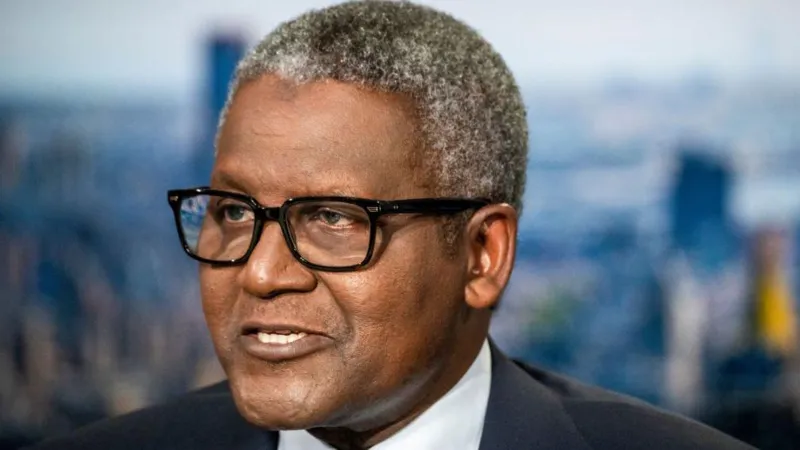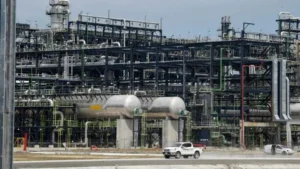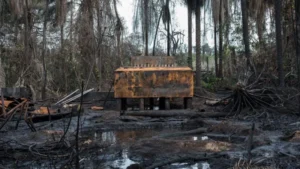Petrol production at Nigerian business tycoon Aliko Dangote’s $20bn (£15.5bn) state-of-the-art oil refinery ought to be some of the best business news Nigeria has had in years.
But many Nigerians will judge its success on two key questions – firstly: “Will I get cheaper petrol?”
Sorry, but probably no – unless the international price of crude drops.
And secondly: “Will I still have to spend hours watching my hair turn grey in a hypertension-inducing fuel queue?”
Hopefully those days are gone but it might partly depend on the behaviour of what Mr Dangote calls “the oil mafia”.
For much of the time since oil was first discovered in Nigeria in 1956, the downstream sector, which includes the stage when crude is refined into petrol and other products, has been a cesspit of shady deals with successive governments heavily involved.
It has always been impossible to follow the money, but you know there is something dreadfully wrong when the headline “Nigeria’s state-owned oil firm fails to pay $16bn in oil revenues”, pops up on your news feed, as it did in 2016.
It is only in the last five years that the state-owned Nigerian National Petroleum Company (NNPC) has been publishing accounts.
The Africa head at the Eurasia Group think-tank, Amaka Anku, hails the Dangote refinery, in which the NNPC has a 7% stake, as “a very significant moment” for the West African state.
“What you had in the downstream sector was an inefficient, corrupt monopoly,” she says.
“What the local refinery allows you to do is have a truly competitive downstream sector with multiple players who will be more efficient, profit making and they’ll pay taxes.”
To put it bluntly, the population of this oil-rich nation has been conned on a colossal scale for many years.
Oil revenue accounts for nearly 90% of Nigeria’s export earnings but a relatively small number of business people and politicians have gorged themselves on the oil wealth.
Aspects of the business model have been baffling, including that of Nigeria’s four previously existing oil refineries.
Built in the 1960s, 70s and 80s, they have fallen into disrepair.
Last year Nigeria’s parliament reported that over the previous decade the state had spent a staggering $25bn trying and failing to fix the moribund facilities.
So Africa’s largest oil producer has been exporting its crude which is then refined abroad, much to the delight of some well-connected traders.
It would be like a bakery with a broken oven. But rather than fix it, the owner sends balls of dough to another firm that shoves them in a working oven and sells the loaves back to the baker.

The NNPC swaps Nigeria’s crude oil for the refined products, including petrol, which are shipped back home.
Exactly how much money changes hands and who benefits from these “oil swaps” is just one of the unknowns in these deals.
“No-one has been able to nail down who exactly has benefited. It’s almost like a beer parlour gossip about who is getting what,” says Toyin Akinosho of the Africa Oil+Gas Report.
The NNPC began subsidising the price of petrol in the 1970s to cushion the blow when global prices soared. Every year it clawed this money back by depositing lower royalty payments – the money it received for every barrel pumped out of the ground – with the Nigerian treasury.
In 2022 the subsidy cost the government $10bn, more than 40% of the total money it collected in taxes.
On his second day in office Nigeria’s Vice-President Kashim Shettima referred to “the fuel subsidy scam” being “an albatross around the neck of the economy”.
Nigerian oil expert Kelvin Emmanuel says in 2019 the country’s official petrol consumption “jumped by 284% to 70m litres per day without empirical evidence to justify such a sharp increase in demand”.
Parliament has previously reported that – at least on paper – importers were being paid to bring in far more petrol than the country consumed. There was a lot of money to be made exporting some of the subsidised petrol to neighbouring countries where prices were far higher.
The NNPC earned billions of dollars a year from the crude oil production. But for many years, under previous governments, some of its profits never reached the treasury as it was accused by state governors and federal lawmakers of including these inflated subsidy costs on its balance sheet.
The NNPC did not respond to a request for an interview or a response to these allegations but in June denied it had ever “inflated its subsidy claims with the federal government”.
It may have been the main source of revenue for successive governments but for decades, until 2020, the board did not disclose its audited accounts. Its press release from March this year promised more transparency and accountability.
After coming to power in May 2023, President Bola Tinubu said the subsidy was unsustainable and suddenly cut it – pump prices immediately tripled.
He also stopped the policy of artificially propping up the value of the local currency, the naira, and let market forces determine its value.
When he took over, the exchange rate was 460 naira to the US dollar. In November 2024 it was over 1,600.
The triple shock of higher fuel prices, sporadic shortages of supply and a depreciating currency has been a tough body blow for people across the country, many of whom are forced to run generators to keep the lights on and phones charged.
“Beyond the financial burden, the uncertainty and stress of constantly dealing with fuel shortages have added a layer of anxiety to everyday tasks,” is how one Lagos resident summed it up.
“I feel like I’m always navigating through crisis mode. It’s exhausting.”





